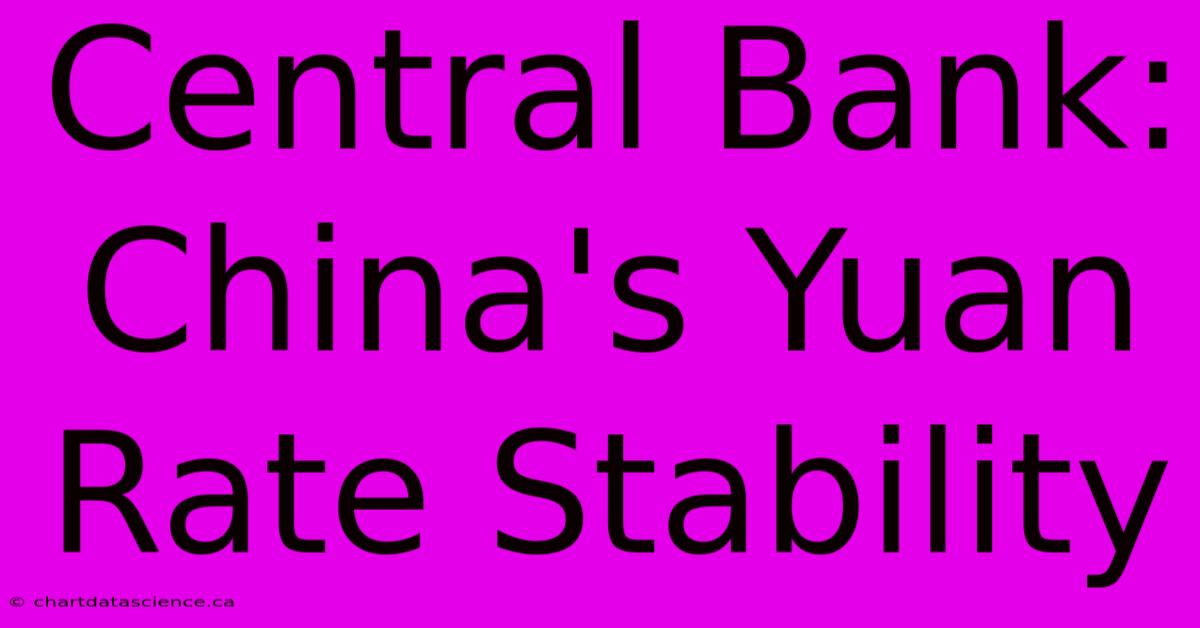Central Bank: China's Yuan Rate Stability

Discover more detailed and exciting information on our website. Click the link below to start your adventure: Visit My Website. Don't miss out!
Table of Contents
Central Bank: Maintaining Stability in China's Yuan Rate
China's economic ascent has been closely tied to the performance of its currency, the Yuan (CNY). The People's Bank of China (PBOC), the nation's central bank, plays a crucial role in managing the Yuan's exchange rate, aiming for stability amidst global market fluctuations and domestic economic pressures. This article delves into the PBOC's strategies for maintaining Yuan rate stability and the complexities involved.
The PBOC's Mandate: Balancing Stability and Flexibility
The PBOC's primary goal is to maintain a stable and manageable Yuan exchange rate. However, "stability" doesn't mean a completely fixed rate. The PBOC operates within a managed floating exchange rate system, allowing for some flexibility while preventing excessive volatility. This approach aims to balance the benefits of a stable currency for trade and investment with the need to adjust to changing economic conditions. A rigidly fixed rate could leave the economy vulnerable to shocks, while excessive volatility can hinder economic planning and foreign investment.
Key Tools for Yuan Rate Management
The PBOC employs a range of tools to influence the Yuan's value. These include:
1. Setting the Daily Reference Rate:
Each trading day, the PBOC sets a central parity rate for the Yuan against the US dollar. This serves as a benchmark for the daily trading range, influencing market expectations and guiding trading activity. The daily setting is influenced by various factors, including the previous day's closing rate, prevailing market conditions, and the PBOC's overall policy objectives.
2. Foreign Exchange Intervention:
The PBOC can directly intervene in the foreign exchange market, buying or selling Yuan to influence its value. For example, if the Yuan depreciates sharply, the PBOC might sell US dollars and buy Yuan to support the currency. Conversely, if the Yuan appreciates too quickly, it might sell Yuan and buy other currencies to curb the appreciation. This intervention is a powerful tool, but it needs careful management to avoid depleting foreign exchange reserves.
3. Interest Rate Adjustments:
Monetary policy tools, such as adjusting interest rates, also affect the Yuan's exchange rate. Higher interest rates can attract foreign investment, increasing demand for the Yuan and strengthening its value. Conversely, lower interest rates can stimulate domestic demand and potentially weaken the Yuan.
4. Capital Controls:
While China has gradually relaxed capital controls in recent years, certain restrictions remain in place. These controls can limit the flow of capital in and out of the country, helping the PBOC manage the Yuan's exchange rate and prevent large, destabilizing capital movements.
Challenges and Future Outlook
Maintaining Yuan stability presents ongoing challenges for the PBOC. These include:
-
Global Economic Uncertainty: Global events, such as trade wars, geopolitical tensions, and unexpected economic downturns, can significantly impact the Yuan's value.
-
Capital Flows: Large capital inflows or outflows can create pressure on the Yuan's exchange rate, requiring the PBOC to intervene to mitigate volatility.
-
Domestic Economic Conditions: Internal economic factors, such as inflation, economic growth, and government policies, also influence the Yuan’s value.
The PBOC continues to adapt its strategies to navigate these complexities. Looking ahead, the Yuan's future trajectory will likely be influenced by a combination of domestic economic reforms, global economic trends, and the PBOC's ongoing efforts to maintain a stable, yet flexible, exchange rate regime. Balancing economic growth with currency stability remains a key priority for China's central bank. The effectiveness of the PBOC's policies in maintaining this balance will continue to be a crucial factor in China’s economic success.

Thank you for visiting our website wich cover about Central Bank: China's Yuan Rate Stability. We hope the information provided has been useful to you. Feel free to contact us if you have any questions or need further assistance. See you next time and dont miss to bookmark.
Also read the following articles
| Article Title | Date |
|---|---|
| Liverpool Vs Fulham Live Match Updates Score | Dec 14, 2024 |
| Macys Store Closures After Holidays | Dec 14, 2024 |
| Australia Vs India Ulasan And Keputusan Perlawanan | Dec 14, 2024 |
| Inec Boss Yakubu Death Hoax Disproved | Dec 14, 2024 |
| Sweet Libertys Brutal Illuminate In Helldivers 2 | Dec 14, 2024 |
